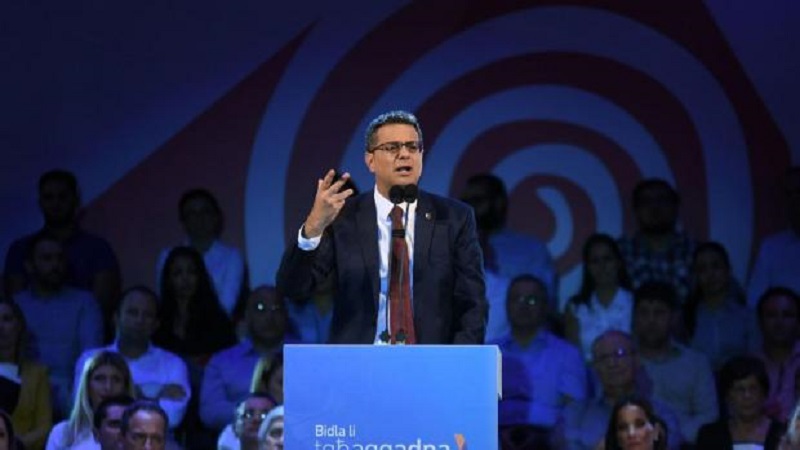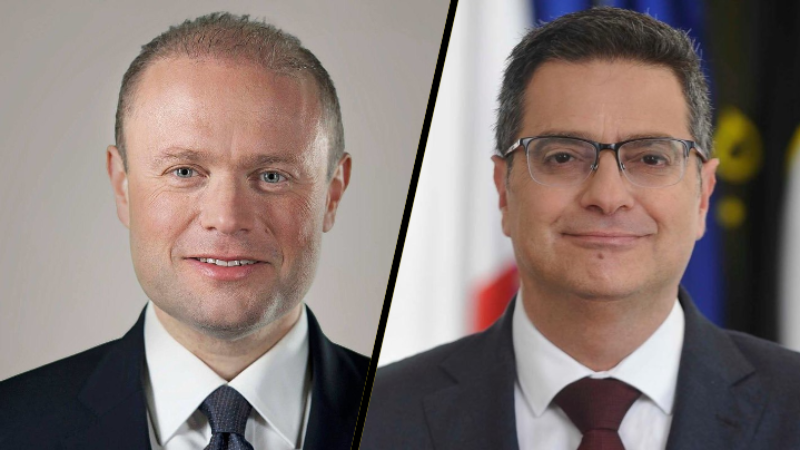Prime Minister Joseph Muscat had repeatedly declared that he will stand down as leader of the Labour Party before the next general election in four years’ time. But the murder of Daphne Caruana Galizia has jeopardised his plan for a job in Brussels after his exit from Maltese politics.
On his part, PN leader Adrian Delia has to decide on a strategy to regroup the Opposition and prepare for MEP elections in 2019 which may ultimately determine whether he stays on as PN leader or not.
As Brussels dream fades away, Muscat may stay
Muscat’s fading Brussels ambitions opens the prospect of a leadership race in a party which is increasingly moulded in the image of its leader. Although officially the race is expected to start after the MEP election in 2019, the situation is creating some uncertainty in the party.
Deputy Leader Chris Fearne – who was not Muscat’s favourite for the post in an internal contest in July – has already positioned himself as a front runner. He has also tried to distance himself from deals authored by Muscat’s close ally, predecessor in the Health Ministry and district rival minister Konrad Mizzi.
Other candidates touted to enter a prospective contest include MEP Miriam Dalli and MP Robert Abela, whose father ex-President George Abela had contested against Muscat in 2008.
Yet increased international scrutiny on Malta following Caruana Galizia’s murder has made the prospect of Muscat moving to a post in Brussels unlikely.
Muscat has once again found himself at odds with the Socialist group which voted to include Malta in the EU’s list of tax havens in an amendment to the Pana committee report.
For some time Muscat was touted in European circles for the post of President of European council Donald Tusk before the latter was reconfirmed in his post for another term. But Muscat may well have been positioning himself for the position after the second term expires in December 2019.
This explains the high profile he assumed on contentious issues like Brexit on which Muscat spoke in a statesmanlike fashion. But all this is now in doubt.
Not surprisingly a petition is already making rounds in the social media urging Muscat to continue leading the party in the next election.
Former Tourism Minister and Muscat’s close friend Edward Zammit Lewis has also urged the Prime Minister to stay on. Moreover in the absence Muscat’s inner circle which includes top guns in Castille like Keith Schembri, may be uneasy about a change in leadership which may leave them in the cold.
Muscat will also have to make his mind up on who to appoint President in April 2019. Will he kick another potential rival upstairs or reward a veteran? Would he be bold enough to reach out to the PN camp in a move aimed to show national unity?
Muscat may also have to consider giving another role to President Marie Louise Coleiro Preca after her exit from the Presidency – she has completely excluded contesting MEP elections, but she has not excluded a return to politics when her term expires. Coleiro Preca may become a natural magnet for the fractured and demoralised left in Muscat’s party.
Egrant and the sword of Damocles
Still weighing on Muscat is Aaron Bugeja’s magisterial inquiry which will probably be published some time next year. Muscat has promised to resign if any evidence or suspicion linking him or his wife Michelle to secret Panama company Egrant is found.
Many have expressed scepticism following the episode of the Pilatus Bank owner taking off with packed suitcases a few hours after the revelations by slain journalist Daphne Caruana Galizia. The worst scenario for Muscat would be an inconclusive inquiry which retains the suspicion.
Muscat had declared that his Chief of Staff Keith Schembri will have to resign if he is arraigned in court. If this happens, Muscat’s political position may well become untenable because he will also have to shoulder political responsibility for confirming Schembri as Chief of Staff and re-appointing Mizzi as minister after the general election if any of the two are arraigned in court.
Muscat may choose to ride on popular support, especially if he wins the next MEP elections by a large margin and ignore concerns on the shady dealings he is connected with, especially in view of expected long court procedures. Moreover, if Labour wins by an even larger margin than in 2013 and 2017, Muscat will become even more indispensable to Labour.
Delia: Preparing for the do-or-die election

The new Nationalist leader Adrian Delia will be under intense pressure to bring his house in order to give Muscat a run for his money in the 2019 MEP election.
Over the past months Delia has galvanised part of the PN’s core vote especially those who felt left out by previous leader Simon Busuttil. His party has also collected a considerable sum of money in a fund raising marathon this month which suggests that the party has made some inroads with the business class.
But opinion polls show him making no inroads with the electorate as Labour seems to have widened its lead. A large section of the PN’s own electorate does not trust Delia, himself a target of Caruana Galizia before she was murdered. Delia knows that he will be toast if Labour increases its margin in the next electoral appointment.
The emergence of a group of rebel MPs who abstained on a motion presented by Delia to a legal notice granting leave to IVF patients who travel abroad, has fuelled speculation on a possible split.
The composition of this group is not yet clear and may vary according to the issue at stake. Probably internal opposition to Delia is not limited to the six MPs who abstained on this motion.
The Maltese electoral system and the PN’s long tradition of being a broad church, militates against a split which remains a very unlikely prospect.
But the emergence of a rebel group of MEP spells trouble for Delia who needs to count on the loyalty of his parliamentary group to able to reshape his party in his image. Delia may well end up being subjected to Chinese torture which would ensure his defeat in MEP elections in 2019 and his departure from the leadership. But backbench rebels also risk being branded as party traitors.
Delia may respond to this by becoming even more of a hardliner in his opposition to the Muscat government. By going on the attack he may manage to keep the different wings of his party united in their common contempt for the Labour leader.
In doing so, he may risk alienating middle of the road voters and give the chance to Muscat to position himself as a moderate. Delia may offset this by being belligerent on issues like corruption while offering his hand of cooperation on other issues.












